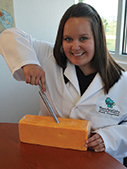 |
|||

|
 |

|
|

Millennials discuss COVID-19, collaboration and community
Editor’s note: “Mind of a Millennial” is CMN’s segment tapping into the unique perspectives of dairy industry professionals born between 1981 and 1996. As this segment of the population begins to take on increasing leadership roles at companies across the industry, we delve into the challenges millennials face in today’s fast-paced workforce, from communication to management style to work/life balance.
MADISON, Wis. — It’s been a challenging year for the entire industry, and millennial dairy industry leaders have been uniquely positioned to navigate this “new normal” while balancing child care, continuing education and other factors in addition to work demands.
In our fourth round of “Mind of a Millennial,” leaders from across the industry discuss communication and feedback preferences, team building and giving back to their communities, all against the backdrop of the ongoing COVID-19 pandemic.
This round’s participants are:
• Casey Baumler, director of sales, Midwest and Canada, Chr. Hansen Inc., Milwaukee
• Janae Olson, head of corporate development at Dahmes Stainless Inc., New London, Minnesota, and M.A. Organizational Leadership Student at Saint Mary’s University of Minnesota, Winona, Minnesota
• Samantha Rohan, quality assurance coordinator/licensed Wisconsin cheese grader, Wisconsin Aging & Grading Cheese Inc., Kaukauna, Wisconsin
• Michael Sachau, market development director, TC Transcontinental, Montréal
• Anastasia Stuyt, cheesemaker, Stuyt Dairy Farmstead Cheese Co., Escalon, California
1. Conventional wisdom is that each generation communicates somewhat differently. How do you like to receive feedback, both positive and negative? Do you prefer the traditional year-end review or regular check-ins?
 |
Casey Baumler |
Baumler: Constructive feedback is critical to development, but it can be difficult to hear. A holistic approach to feedback helps me step back and see with more clarity. I prefer to receive feedback verbally than through other methods as it allows me to have better perception of intent. I think that regular check-ins are far superior to traditional end-of-year reviews. In today’s rapidly-changing world, a target set at the beginning of the year could be irrelevant by year-end.
Olson: Continuous feedback drives continuous improvement, so I believe regular check-ins are necessary for getting the most from a team. Ideally, a manager and employee would set clear expectations together, then measure performance based on what was established. Encouragement when things go well along the way is critical for reinforcing the right behaviors, and on the flip side, conversations about things that didn’t meet expectations are better received when it’s fresh in the employee and manager’s minds. If you’re a manager of people, make time for your employees. It will be worth it.
Rohan: Receiving feedback from a superior can be difficult at times, but I think it is necessary to receive both positive and negative feedback to grow and develop on the job. I like to receive both positive and negative feedback in person versus written. I find in-person feedback is more beneficial because I can hear the tone and read facial expressions of the person giving the feedback. I like to receive feedback on a regular basis close to the event so I can benefit from it for future situations.
Sachau: It seems everyone has different styles and preferences when it comes to communication, regardless of generation. I think the most important aspect is to better understand the person you are communicating with in order to ensure an open, respectful conversation. I personally like to receive both positive and negative feedback in order to understand things going well and areas of improvement. As far as frequency, and given the fast pace of everyday business, I prefer consistent check-ins with my team to align on performance, as well as any changes in direction or decisions.
Stuyt: I like to receive both positive and negative feedback face to face. I prefer regular check-ins. It lets you know right away when you have done something great or if you have some areas where you need to improve upon. If you have a year-end review, you go a whole year without doing things different or receiving positive encouragement.
2. How do millennials approach collaboration compared to other generations? What priorities do they look for when hiring and building a team?
Baumler: The approach I see most often is relying on others for their expertise to help the decision process. Millennials recognize that each person on a team adds value through their own unique skills and experiences. It is much different from a direct line decision-making approach.
Building a team is all about positioning and creating balance through a variety of skill sets. Teammates should be able to answer the questions I’m unable to. This will require that I look outside of myself and my comfort. Key items I look for include social interaction, knowledge in the field and the motivators that empower people to want to be at their best.
Olson: I recall early on in my career when I worked for a healthcare IT organization and hadn’t been exposed to a lot of collaborative efforts at that point. A new leadership team came on board, and boy, were they collaborators. It was a turning point in my career because I was able to experience firsthand how much more effective a team can be when you work across departments, play to individuals’ strengths and achieve an outcome you had no idea was possible. Fast forward to today, and I still see the benefits of collaborating — whether it’s at a whiteboard, on a video call or in the boardroom. You get a better outcome when you allow diverse perspectives to come together and be heard.
 |
Samantha Rohan |
Rohan: Millennials have been raised with more available technology than other generations. They are very comfortable collaborating with their team using online resources. Being a millennial myself, I find it very easy to pick up my phone to respond to messages anytime during the day, even nights and weekends. When building a team, millennials look for flexibility and knowledge of technology.
Sachau: Millennials have always desired to collaborate in innovative ways, pushing the boundaries of traditional work models. Flexible hours, work/life balance and remote working are areas that seem to have gained some traction, especially now with the coronavirus keeping so many people out of the joint office setting. When creating these working teams and developing talent, I believe millennials value diversity and dependability. Having diversified opinions and experiences lend to greater perspective and better creative problem solving, while also being accountable to one’s commitments.
Stuyt: I am not sure how others approach collaboration, but I look for like-minded and motivated people to work with. While in college there were always group projects to be done, and I would choose people whom I could tell were engaged in the class and willing to work as a group. We are a small business, so there are no collaborations or team building within our company just yet.
3. Compared to previous generations, millennials have been known to change jobs more frequently throughout their careers. What are some of the top priorities for you in looking to stay with a company?
Baumler: Cultural fit is the top priority for me. We have a great culture model at Chr. Hansen in that we work for a better world and yet deliver results. We also rely on each other and act with freedom. Motivation to be the best version of yourself is easy to find when you have the entire organization behind you and we are aligned in our actions.
Olson: Since graduating college, I have worked at eight companies in 11 different roles. Earlier this year, I transitioned to a new organization in the manufacturing industry. When I shared my news with a leader whom I had looked up to with my exciting news, the response I received was, “…Just checked my records. You started at x company when I hired you on March 27, 2017. That means you will have had five jobs in just over three years…” The email went on to say, “…the companies you have worked for are not the issue. You need to take the time and spend the money to really figure out who you are.” Wow, that was unexpected and eye opening.
A leader whom I had admired had a much different perspective on how long a person should stay with an organization.
My view is much different. If a person becomes stagnant in a role, and there isn’t another seat for them in an organization, it’s best for the individual and the company for that person to move on. In addition, if an individual’s values and beliefs don’t align with a company, then they most certainly should continue searching for an organization that does. While it took 15 years, I was much more intentional about asking questions related to values and culture when I sought a new company to join this spring. Opportunities for challenge and growth, along with working for a supportive manager, and flexibility (let’s face it, now more than ever, people need flexibility to not only survive, but thrive) top my list of important deciding factors when choosing an organization to work for.
Rohan: Some of the top priorities I look for in a company include company values and culture. I think it is important for a company to value honesty, integrity and hard work. Having co-workers you get along with is a key to being happy at a job.
Sachau: One top priority of mine when I’m with a company is finding the right team to work with. So much of our daily, weekly, yearly life is collaborative interaction with our immediate colleagues; it is important to find a place that challenges me, yet also provides an opportunity to enjoy my teammates. Another priority has been leadership. Whether regarding a small team, a business unit or the overall company, quality leadership is important to me to help drive results and create a positive work experience.
 |
Anastasia Stuyt |
Stuyt: My top priority for staying with a company is that I am happy at my job. I had previously left a great company because I was not happy there. It was not the right job for me. I also need to be respected and get along well with my co-workers.
4. What’s the most important lesson you have learned at work?
Baumler: Transitioning from a front line contributor to an enabler and coach for a greater team. This included moving from a very analytical mindset that was set with finite detail and into a grey area where openness and an infinite mindset are critical to the journey toward success.
Olson: Being a young female in a male-dominated industry can be challenging at times. While I’ve learned many lessons in my career, the one that stands out the most is to not lose sight of who you are. When a person is able to be their authentic self, and not worry about the opinions of others, they are able to do their best work. Many companies have tried to shape me into this mold of who they wanted me to be, and that just never worked. It’s so easy to fall into this trap, but in the end, you’ll likely never be fulfilled. Be yourself. Work at an organization that values authenticity. Feel fulfillment.
Rohan: The most important lesson I have learned is that you must earn and prove your worth. Hard work and dedication are key to gaining your employer’s trust. It is important to show your employer what you can bring to the table and why you deserve to be there.
Sachau: My most important lesson has been respect. Respect everyone around you regardless of their rank or position at the company. Treating others well, even while pushing back or disagreeing with their position, creates a positive and rewarding place to work.
Stuyt: The most important lesson I have learned is simply to work hard. Even if it does not seem like it, someone is noticing the effort you put forth at work every day. I did not grow up with a cell phone or video games. My weekends and summers were spent working on the dairy. That taught me the value of hard work. Aside from that, communication in the workplace is key to a great team.
5. As a generation, millennials are known for being involved in their communities and wanting their jobs to mean something. Do you do volunteer work? If given time off to be involved within your community, what would you do?
Baumler: My family and I are involved in our local community through involvement with our church as well as local schools. We enjoy involvement in youth faith formation and blessings in a backpack as well as coaching kids in the community.
 |
Janae Olson |
Olson: In 2020, I became a board member of the Kandiyohi CEO Program (Creating Entrepreneurial Opportunities). In short, the program is filled with high school juniors and seniors who learn about various businesses in the community and actually start a business of their own. I wish I would have had an opportunity when I was in high school to be part of something like this program, and that’s really what drives me to want to be part of it. Traditional high school classes don’t work for everyone, and this program allows students to step out of the box and learn in a completely different way. I’ve supported this program in various ways for several years, and look forward to contributing more in the future.
Rohan: I do volunteer periodically with various events within my community. If I were given time off, I would be interested in getting further involved with the agricultural programs in my community to help educate and promote the dairy industry.
Sachau: As a new father to a busy toddler, the term “time off” is recently nonexistent, as anyone can imagine. Having previously worked with volunteer organizations like Big Brothers Big Sisters and Habitat for Humanity, I’ve really enjoyed spending time getting to know the families and seeing the impact of the work put in. As my daughter grows, I hope to find time to volunteer in a way that she can participate with me, whether at her school, or some place in the community such as food banks or a local park department.
 |
Michael Sachau |
Stuyt: I volunteer my time for several boards. I currently serve as the vice president for the California Artisan Cheese Guild board of directors. I am the chairperson for the District 5 Dairy Princess Program put on by the California Milk Advisory Board. I am also the Marshall for the Our Lady of Fatima Celebration at our local church.
6. How has the coronavirus pandemic impacted future planning for 2021 at your company? Have there been significant changes in the flow of operations, communications or other aspects at your company?
Baumler: Actually, we postponed the launch of our 2025 Strategy from April to August, allowing ourselves to better understand the implications of the pandemic on Chr. Hansen’s business in the near future as well as long-term. At the same time, we were working hard to find flexible ways to maintain business continuity while looking out for everyone’s health and safety. The way we mobilized during the pandemic shows that we have a strong culture to act with agility and succeed when faced with extraordinary challenges. The pandemic has confirmed to us as a company that our advocacy and determination to shape a more resilient agri-food system based on natural, microbial solutions are more relevant than ever. There is simply a growing call for transformative changes in the way we produce and consume food. The reboot of our economy must have a green signature.
Olson: As an essential business, Dahmes Stainless Inc. continues to serve customers and has experienced minimal disruption because of COVID-19. We understand the important role our customers play in the world, and are committed to supporting them with ideal industrial process solutions. We have found, and continue to create, creative ways to navigate through the pandemic.
Rohan: My company has taken the coronavirus pandemic one day at a time with constant evaluation on what the future could look like. It is difficult to plan for 2021 when everything can and has changed so quickly. Like a lot of other companies, we have been operating remotely and in person. We have been collaborating as a team virtually and it has been working out well for us. If we can stay as close to business-as-usual we will continue the path we are on. We will most likely do this until we feel it to be safe to bring our small group back together. With a small company, each person is critical to the flow and success.
Sachau: As a manufacturing company, we are continuously evaluating risks that might have an impact on our production capabilities and our product. The coronavirus has been a major threat and challenged us to build additional layers of continuity and redundancy to the processes we already have in place. One of the most noticeable changes resulting from the pandemic is the way in which we communicate. Those on the team that can work remotely have quickly adapted to working virtually and found new ways to interact, both internally and externally to TC.
Stuyt: Due to the coronavirus impact we have not been able to fully plan for 2021. The future is so uncertain, cheese sales are down, and we have not been making as much cheese as we normally do. We slowed our production because distributors and stores had stopped ordering. We hope 2021 brings us increased orders and a new distributor, but only time will tell.
CMN
| CMN article search |
|
|
© 2024 Cheese Market News • Quarne Publishing, LLC • Legal Information • Online Privacy Policy • Terms and Conditions
Cheese Market News • Business/Advertising Office: P.O. Box 628254 • Middleton, WI 53562 • 608/831-6002
Cheese Market News • Editorial Office: 5315 Wall Street, Suite 100 • Madison, WI 53718 • 608/288-9090